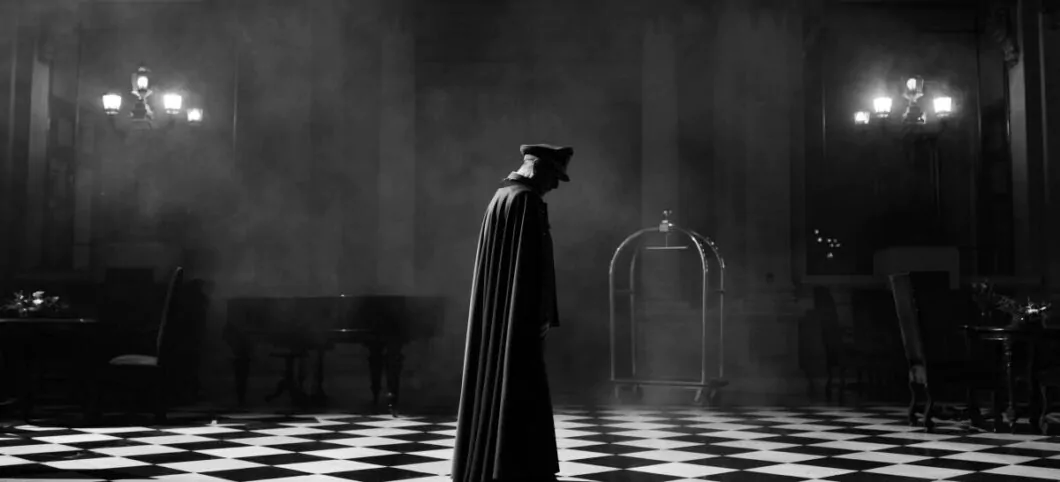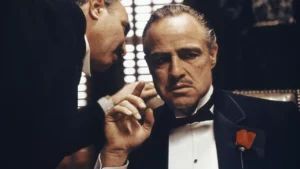
El Conde takes us on a wild journey through a parallel universe where Augusto Pinochet, a symbol of world fascism, is reimagined as a vampire living in seclusion on a remote island.
El Conde Movie Cast and Characters
- Jaime Videl as Augusto Pinochet
- Alfredo Castro as Theodore
- Antonia Ziegers as Carmen
- Gloria Munchmeyer as Lucia
- Paula Luke Singer as Demon (Marie Antoinette)
- Margaret Thatcher as Herself (Narrator)
El Conde Movie Plot
After 250 years of life, Pinochet decides to end his immortal existence, haunted by his legacy as a tyrant. His adult children return home, unaware of his true nature, to claim their inheritance, while a nun disguised as an accountant secretly aims to perform an exorcism on Pinochet, believing his evil stems from a demon.
As the family’s greed clashes with supernatural secrets, a darkly humorous and satirical tale unfolds. The film explores themes of power, greed, ambition, and the weight of history, all set against a backdrop of stunning black-and-white cinematography.
El Conde Movie Review
Pablo Larrain’s directorial prowess shines brightly in El Conde. Known for his previous works such as “Tony Monero” and “The Club,” Larrain demonstrates a remarkable ability to infuse his films with unique visual aesthetics and thought-provoking narratives. In El Conde, he takes the audacious step of reimagining Augusto Pinochet, a historical figure synonymous with tyranny, as a vampire. This bold vision combines elements of horror, dark humor, and political satire, pushing the boundaries of storytelling. Larrain’s willingness to challenge conventional norms and his talent for blending genres seamlessly make El Conde a cinematic tour de force. His direction invites viewers into a world where absurdity coexists with profound reflection, leaving an indelible mark on the audience’s imagination.
The ensemble cast of El Conde delivers performances that breathe life into a cast of eccentric characters. Jaime Videl’s portrayal of the aged vampire Pinochet is both enigmatic and unexpectedly sympathetic, adding layers to a character rooted in history. Alfredo Castro’s Theodore, Pinochet’s assistant, brings depth and complexity to his role, while Antonia Ziegers shines as Carmen, the exorcist nun with hidden agendas. Gloria Munchmeyer’s Lucia and Paula Luke Singer’s Demon infuse the narrative with eccentricities that enhance the film’s unique charm. Together, this ensemble creates a bizarre yet compelling group of characters that captivate and engage viewers throughout the film. Their performances, laced with dark humor and nuance, add depth to the narrative and contribute to the film’s overall success.
The Story Behind El Conde
El Conde stands as a gonzo mishmash of pulpy B-movie tropes artfully blended into a purposefully vulgar display of horrific historical fiction. The film’s audacious take on history, political figures, and the weight of their actions contribute to a narrative that is both thought-provoking and entertaining. While it may not provide an exhaustive historical context for viewers unfamiliar with Pinochet, the film’s brilliance lies in its ability to create a captivating alternate reality ripe for exploration. The story behind El Conde challenges conventional narratives and invites audiences to question the boundaries of storytelling. It is a satirical journey that cleverly weaves together elements of power, greed, and ambition against a backdrop of stunning black-and-white cinematography.
El Conde introduces a unique and captivating lore, reimagining historical figures as vampires in a parallel universe. In this alternate reality, Augusto Pinochet, known for his brutal dictatorship, becomes an aged vampire seeking redemption for his past atrocities. The film explores the consequences of immortality, greed, and the weight of history on these supernatural beings. The lore delves into the idea that vampires can de-age by consuming the hearts of their own kind, adding a layer of complexity to the story.
El Conde weaves in historical and political figures such as Margaret Thatcher and Marie Antoinette, further blurring the lines between reality and fiction. Margaret Thatcher, portrayed as a vampire and Pinochet’s mother, adds an intriguing twist to the narrative. The film’s lore challenges viewers to reconsider their perceptions of historical events and figures, offering a satirical commentary on power and legacy. It is within this rich and imaginative lore that El Conde finds its strength, providing a unique and unforgettable cinematic experience that lingers in the mind long after the credits roll.
The Highlight of the Movie
One of the most exceptional aspects of El Conde’ is undoubtedly its stunning black-and-white cinematography. Cinematographer Edward Lachman’s work in this film stands as a testament to his ability to capture both the grandeur of sweeping landscapes and the intimacy of character-driven moments. Each frame is meticulously composed, creating a visual experience that transcends the boundaries of conventional cinema. The use of black and white not only adds a timeless quality to the film but also enhances its thematic depth. It allows the audience to see the characters and their actions through a unique lens, inviting contemplation and reflection.
Furthermore, the cinematographer’s ability to switch seamlessly between intimate character moments and breathtaking landscapes enhances the storytelling. Whether it’s a close-up of a character’s face, conveying their emotions, or a wide shot capturing the desolate beauty of the island where Pinochet resides, every frame serves a purpose. It’s a visual feast that adds layers of meaning and depth to the story, making El Conde a truly unforgettable cinematic experience.
The live instrumentation in the film’s score complements the cinematography beautifully, creating an atmospheric and haunting mood. The film’s visual style, with its deliberate use of black and white, enhances the overall viewing experience. Edward Lachman’s cinematography elevates the film to a level of artistry rarely seen in modern cinema. From sweeping landscapes to intimate character studies, each shot is a masterclass in visual storytelling.
The Movie Culture Synopsis
In conclusion, El Conde is a visually striking and thought-provoking cinematic experience. Despite some moments of confusion and a lack of historical context for those unfamiliar with Pinochet, the film successfully combines humor, satire, and horror into a compelling narrative. The strong performances, stunning cinematography, and unique storytelling make it a must-watch, especially for history enthusiasts with a taste for the absurd.
Should you watch it? Absolutely. El Conde is a bold and ambitious film that pushes the boundaries of storytelling, making it a captivating and memorable cinematic experience. Whether you’re a fan of humor, political satire, or visually striking cinema, this movie has something to offer. Don’t miss the opportunity to immerse yourself in the twisted world of El Conde on Netflix. It’s a journey that will leave you both entertained and contemplative, a true gem in the realm of unconventional storytelling.




